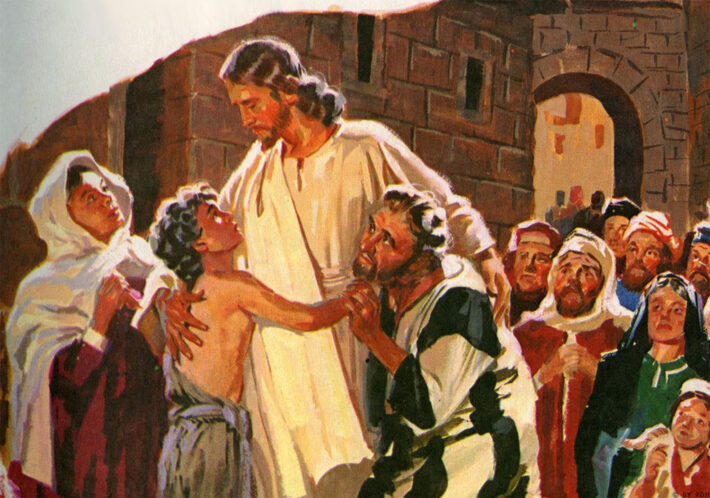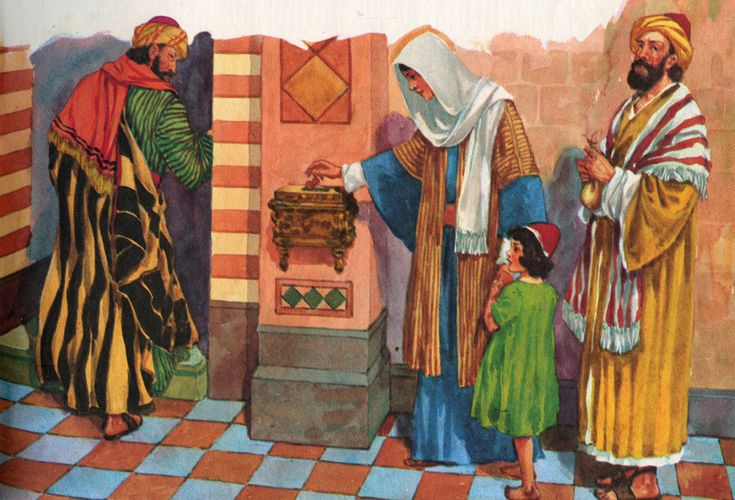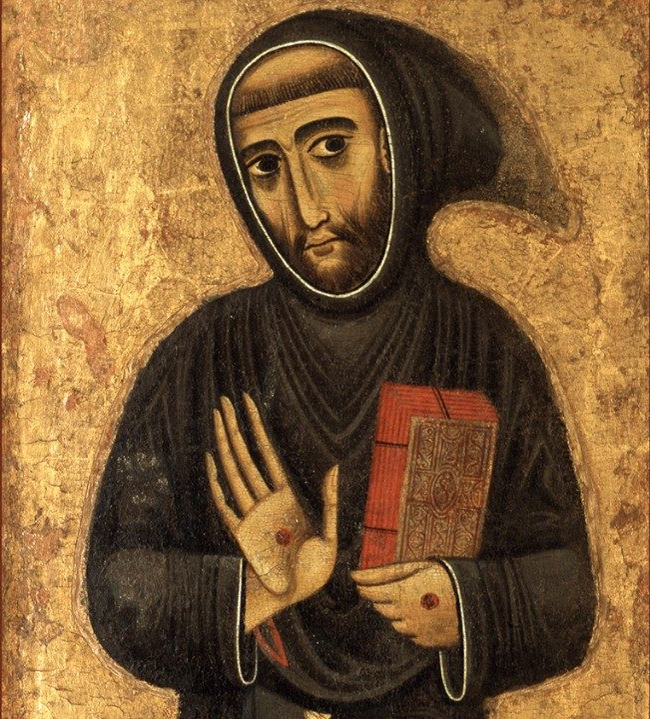Christian Art | Jesus Of Nazareth
Mark 3: 7-12 – Week 2 Ordinary Time, Thursday (Audio Bible KJV, Spoken Word)
7 But Jesus withdrew himself with his disciples to the sea: and a great multitude from Galilee followed him, and from Judæa,
8 And from Jerusalem, and from Idumæa, and from beyond Jordan; and they about Tyre and Sidon, a great multitude, when they had heard what great things he did, came unto him.
9 And he spake to his disciples, that a small ship should wait on him because of the multitude, lest they should throng him.
10 For he had healed many; insomuch that they pressed upon him for to touch him, as many as had plagues.
11 And unclean spirits, when they saw him, fell down before him, and cried, saying, Thou art the Son of God.
12 And he straitly charged them that they should not make him known.
Mark’s Gospel tells us that, astonishingly quickly, Jesus has become the focus of a vast popular movement. He is preaching in Galilee, and his listeners have come all the way from Judea, from Jerusalem, and from Jordan, Tyre and Sidon. It is an international crowd, and these really are great distances. Jerusalem is over 100 kilometres from Lake Galilee, at its nearest point and as the crow flies. That’s a good few days on foot, and no package tour pilgrimage.
Everybody wants a piece of this astonishing man called Jesus, the like of whom no-one has seen or even heard of before. Blazing at the centre of this multitude of people, the revolution is happening – and Mark tells us again and again that it is happening because Jesus forgives sins, casts out devils, and heals. Jesus is setting a people free, in a way that no-one ever before could do, not even Moses.
Jesus’ mission on earth requires his true, full identity to be cloaked – he must not yet be known as the Son of God. It is entirely natural that we should ask why this might be – why didn’t Jesus just announce himself there and then and establish in the eyes of everyone, so no-one could deny it, the Messianic age and a glorious Kingdom of God? Why the mystery?
One response to these questions has already begun to be apparent in the desire of the Pharisees to destroy Jesus. In the Gospels, chapter by chapter, verse by verse, we are walking with Jesus toward the cross of our salvation. The crucifixion looms through Christ’s mysterious message and mysterious identity.
We also remember the true nature of the Kingdom of God Jesus came to inaugurate, which is not an earthly kingdom for the Jews alone, a stable and self-governing nation-state of the virtuous long-chosen people of God at long, long last. The Kingdom Jesus Christ inaugurates is a Kingdom for all nations, all over the whole world, and it is a spiritual Kingdom, not of the world but of God. There is a hiddenness to this as well, from Christ’s time down to our own day. We embrace a supernatural reality which shines in the eyes of the faithful, as it were at a hairs’ breadth remove from this world, hovering close, touching in.
Our salvation in Jesus Christ hinges on mystery, on the fact that Jesus is both God and man. Only in the Word of God become man is the work of our redemption effected. We depend upon his human nature as upon his divine – our humanity is assumed by Jesus in order to be redeemed.
When we look to the cross, we see a human and we see God. At the same time, Jesus is not 50% God, 50% human; he is 100% God and 100% human. It is this holy human nature of our Lord which is our route to salvation. Blood has been spilled through the centuries debating this mystery – the Church has split and split and split again because of people’s contesting ideas about Jesus. Small wonder that these great truths had to be revealed only gradually and in part during Jesus’ ministry.
Lord God, true Light and Creator of light,
grant that faithfully pondering on all that is holy,
we may ever live in the splendour of your presence.
We make our prayer through our Lord.
![]()

Audio Bible KJV | Endnotes
The Character Of Jesus In Saint Mark’s Gospel
Saint Mark’s Gospel is marked by a sense of danger, urgency, and pace. From the very beginning, we see Jesus engaging in intense spiritual battles with Satan and his minions, as Jesus is tempted in the wilderness and casts out demons (Mark 1:12-13, 21-28). Jesus is also constantly on the move, traveling from town to town, preaching and performing miracles, with crowds following Jesus wherever he goes.
This sense of urgency is reflected in the language of the Gospel, which is full of action verbs and short, concise sentences. The narrative moves quickly from one event to the next, with little time for reflection or explanation. For example, in Mark 1:16-20, we see Jesus calling his first disciples:
‘Now as he walked by the sea of Galilee, he saw Simon and Andrew his brother casting a net into the sea: for they were fishers. And Jesus said unto them, Come ye after me, and I will make you to become fishers of men. And straightway they forsook their nets, and followed him. And when he had gone a little further thence, he saw James the son of Zebedee, and John his brother, who also were in the ship mending their nets. And straightway he called them: and they left their father Zebedee in the ship with the hired servants, and went after him.’
The language here is simple and direct, reflecting the immediacy of the call and the disciples’ willingness to drop everything and follow Jesus. The pace of the narrative is relentless, with one event following closely on the heels of another.
This sense of danger and urgency is also reflected in Jesus’ teachings, which often emphasize the need for repentance and the coming judgment. In Mark 1:15, Jesus proclaims: ‘The time is fulfilled, and the kingdom of God is at hand: repent ye, and believe the gospel.’ This message of imminent judgment is reinforced throughout the Gospel, with Jesus warning of the coming destruction of Jerusalem and the need to be ready for his return (Mark 13:1-37).
A notable aspect of Saint Mark’s Gospel is the relative ignorance of Jesus’ closest followers. Despite spending much time with Jesus, the disciples often fail to understand Jesus’ teachings or the true nature of Jesus’ mission. In Mark 8:31-33, Jesus foretells his own death and resurrection, but Peter rebukes him:
‘And he began to teach them, that the Son of man must suffer many things, and be rejected of the elders, and of the chief priests, and scribes, and be killed, and after three days rise again. And he spake that saying openly. And Peter took him, and began to rebuke him. But when he had turned about and looked on his disciples, he rebuked Peter, saying, Get thee behind me, Satan: for thou savourest not the things that be of God, but the things that be of men.’
Despite being one of Jesus’ closest disciples, Peter fails to grasp the significance of Jesus’ words and instead rebukes him. This highlights the theme of spiritual blindness that runs throughout the Gospel, as many of those who should have recognized Jesus as the Messiah fail to do so. It also underscores the importance of faith and humility in following Jesus, as even the disciples struggled to fully comprehend Jesus’ teachings.
The character of Jesus in Saint Mark’s Gospel is multifaceted and complex. Jesus is both human and divine, and this tension is evident in his interactions with others. On the one hand, Jesus is deeply compassionate and empathetic, healing the sick and feeding the hungry. On the other hand, Jesus is also uncompromising in his demands for repentance and his condemnation of sin.
One example of Jesus’ compassion can be seen in Mark 1:40-45, where Jesus heals a man with leprosy:
‘And there came a leper to him, beseeching him, and kneeling down to him, and saying unto him, If thou wilt, thou canst make me clean. And Jesus, moved with compassion, put forth his hand, and touched him, and saith unto him, I will; be thou clean. And as soon as he had spoken, immediately the leprosy departed from him, and he was cleansed. And he straitly charged him, and forthwith sent him away; And saith unto him, See thou say nothing to any man: but go thy way, shew thyself to the priest, and offer for thy cleansing those things which Moses commanded, for a testimony unto them. But he went out, and began to publish it much, and to blaze abroad the matter, insomuch that Jesus could no more openly enter into the city, but was without in desert places: and they came to him from every quarter.’
Here we see Jesus moved with compassion at the man’s suffering, and his willingness to touch a person who was considered unclean by society. However, Jesus also commands the man to keep quiet about his healing, possibly to avoid drawing attention to himself and provoking the authorities.
Another example of Jesus’ uncompromising nature can be seen in his confrontation with the money changers in the temple, as described in Mark 11:15-19:
‘And they come to Jerusalem: and Jesus went into the temple, and began to cast out them that sold and bought in the temple, and overthrew the tables of the moneychangers, and the seats of them that sold doves; And would not suffer that any man should carry any vessel through the temple. And he taught, saying unto them, Is it not written, My house shall be called of all nations the house of prayer? but ye have made it a den of thieves. And the scribes and chief priests heard it, and sought how they might destroy him: for they feared him, because all the people was astonished at his doctrine.’
Here we see Jesus displaying righteous anger at the corruption he sees in the temple, and Jesus’ willingness to confront the religious authorities head-on. This act sets in motion the events that will ultimately lead to Jesus’ arrest and crucifixion.
Throughout Saint Mark’s Gospel, Jesus is portrayed as a teacher and a healer, constantly drawing people to himself and pointing them towards God. Jesus’ teachings are often expressed through parables, such as the parable of the sower (Mark 4:1-20) or the parable of the mustard seed (Mark 4:30-32), which use vivid imagery to convey spiritual truths.
As theologian N.T. Wright puts it, ‘He is not just a wise man, a prophet, or a martyr, but something far more radical, far more shocking, and far more demanding. He is, for Mark, nothing less than the Son of God, come in person to redeem his people and bring in the kingdom of God.’
Pope Francis, in his apostolic exhortation Evangelii Gaudium, also emphasizes the urgency of Jesus’ message and call to repentance. Pope Francis writes: ‘Jesus wants to draw us out of our indifference, our comfortable ways of thinking and acting, our intellectual and moral laziness.’ This urgency is reflected in the pace of Saint Mark’s Gospel, which moves quickly from one episode to the next, conveying a sense of urgency and immediacy.
Pope Francis has called on Christians to ‘go out to the margins’ and serve those in need. This is in line with Jesus’ own teachings, as Jesus says in Mark 10:45: ‘For even the Son of man came not to be ministered unto, but to minister, and to give his life a ransom for many.’








